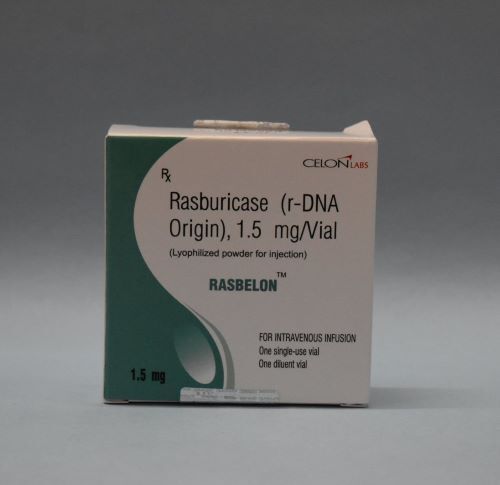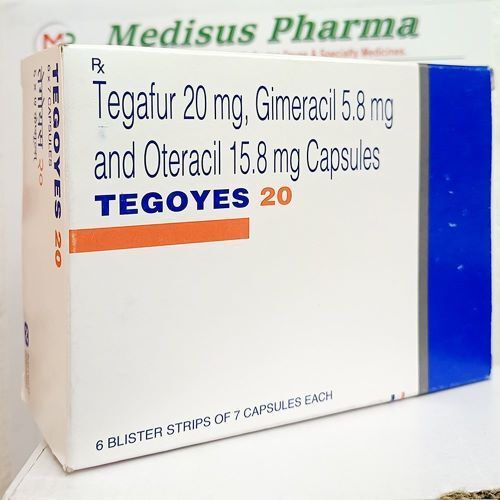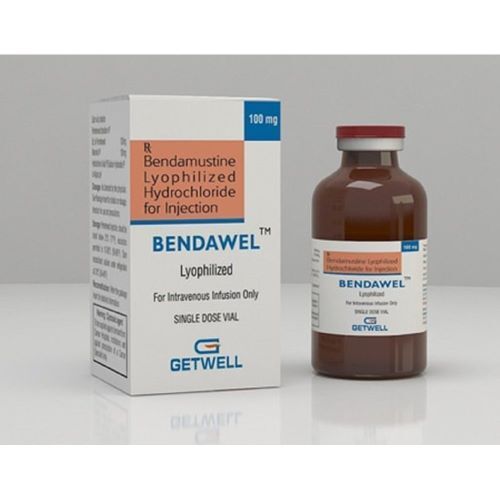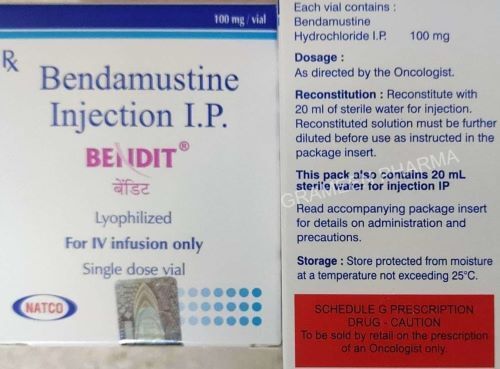Rasburicaser DNA Origin
6500 INR/Vial
Product Details:
- Indication Management of elevated uric acid levels associated with chemotherapy in pediatric and adult patients with leukemia, lymphoma, and solid tumors
- Salt Composition Rasburicase
- Dosage Form Lyophilized Powder for Injection
- Enzyme Types Recombinant Uricase
- Feature High purity, rapid action, minimizes risk of renal complications
- Ingredients Recombinant Rasburicase, stabilizing excipients, buffer solution
- Application Clinical use for rapid reduction of uric acid
- Click to View more
X
Rasburicaser DNA Origin Price And Quantity
- 5 Vial
- 6500 INR/Vial
Rasburicaser DNA Origin Product Specifications
- 24 Months
- Virtually odorless
- Rasburicase
- 7.08.0
- Lyophilized Powder for Injection
- High purity, rapid action, minimizes risk of renal complications
- Recombinant Rasburicase, stabilizing excipients, buffer solution
- High uricase activity >1.0 Units/mg protein
- Recombinant Uricase
- Management of elevated uric acid levels associated with chemotherapy in pediatric and adult patients with leukemia, lymphoma, and solid tumors
- White to off-white lyophilized powder
- 2830C during production in yeast culture
- Store at 28C protected from light; do not freeze
- Clinical use for rapid reduction of uric acid
Rasburicaser DNA Origin Trade Information
- 1000 Vial Per Week
- 4 Days
- Asia, Australia, Central America, North America, South America, Eastern Europe, Western Europe, Middle East, Africa
- All India, South India, Central India, West India, North India, East India, Gujarat, Karnataka, Kerala, Lakshadweep, Mizoram, Meghalaya, Manipur, Andhra Pradesh, Bihar, Chandigarh, Daman and Diu, Goa, Jharkhand, Odisha, Punjab, Assam, Delhi, Dadra and Nagar Haveli, Andaman and Nicobar Islands, Arunachal Pradesh, Chhattisgarh, Haryana, Himachal Pradesh, Jammu and Kashmir, Madhya Pradesh, Maharashtra, Nagaland, Rajasthan, Sikkim, Tamil Nadu, Telangana, Tripura, Pondicherry, Uttar Pradesh, Uttarakhand, West Bengal
Product Description
Rasbelon Injection is used in thetreatment of high uric acid due to chemotherapy. It lowers uric acid levels in the blood which helps prevent kidney damage in cancer patients.
-
What is Rasburicase (rDNA origin)?
- Rasburicase is a medication used to treat and prevent high levels of uric acid in the blood, a condition known as hyperuricemia. It is a recombinant urate oxidase enzyme derived from DNA technology.
-
How does Rasburicase work?
- Rasburicase works by converting uric acid into a more soluble compound called allantoin, which can be easily excreted by the kidneys. This helps to reduce uric acid levels in the blood and prevent complications such as kidney stones and gout.
-
What conditions is Rasburicase used to treat?
- Rasburicase is primarily used to manage hyperuricemia associated with tumor lysis syndrome (TLS), a condition that can occur as a result of cancer treatment when cancer cells break down rapidly and release large amounts of uric acid into the bloodstream.
-
How is Rasburicase administered?
- Rasburicase is administered intravenously (IV) by a healthcare professional in a hospital or clinical setting. The dosage and duration of treatment will depend on the patient's medical condition and response to therapy.
-
What are the common side effects of Rasburicase?
- Common side effects may include allergic reactions (such as rash, itching, swelling, or difficulty breathing), headache, nausea, vomiting, fever, and abdominal pain. These side effects are usually mild and transient.
-
Are there any serious side effects I should be aware of?
- Yes, Rasburicase can cause serious side effects, including severe allergic reactions (anaphylaxis), hemolysis (destruction of red blood cells), methemoglobinemia (a condition where the blood contains elevated levels of methemoglobin), and severe hypersensitivity reactions. Seek immediate medical attention if you experience any severe or persistent side effects.
-
Who should not receive Rasburicase?
- Rasburicase should not be used in patients with a known allergy to rasburicase or any of the ingredients in the medication. It should also be used with caution in patients with glucose-6-phosphate dehydrogenase (G6PD) deficiency, as it may increase the risk of hemolysis.
-
Can Rasburicase interact with other medications?
- Rasburicase may interact with certain medications, including other chemotherapy drugs and medications that affect kidney function. Inform your healthcare provider about all medications, supplements, and herbal remedies you are taking before starting Rasburicase treatment.
-
How should Rasburicase be stored?
- It should be stored at room temperature (20-25C) away from light and moisture. Follow the specific storage instructions provided by your pharmacist.
-
Efficient Uric Acid Reduction for Chemotherapy Patients
Rasburicase offers rapid and reliable control of elevated uric acid levels in both pediatric and adult patients dealing with hematologic malignancies or solid tumors. Its prompt action significantly minimizes the risk of renal complications associated with tumor lysis syndrome during chemotherapy. High purity and robust uricase enzymatic activity, with more than 1.0 Units/mg protein, ensure strong clinical efficacy.
Advanced Biotechnology and Purity Standards
Produced using recombinant DNA technology in yeast culture at 2830C, Rasburicase is free from animal-derived proteins and preservatives. It is formulated as a lyophilized powder and complies with all relevant pharmacopeial standards, ensuring a safe and consistent product experience for healthcare providers and patients.
Safe Handling and Administration Guidelines
Each vial must be reconstituted with sterile water for injection only, then diluted in 0.9% sodium chloride. Rasburicase should never be mixed with dextrose-containing solutions, as incompatibility may occur. The reconstituted solution is stable for 24 hours at 28C, though administration immediately after preparation is recommended for optimal efficacy.
FAQs of Rasburicaser DNA Origin:
Q: How should Rasburicase be prepared and administered?
A: Rasburicase should be reconstituted with sterile water for injection only. The reconstituted solution must then be diluted in 50 mL of 0.9% sodium chloride before administration as an intravenous infusion over 30 minutes. Use immediately after preparation for the best results.Q: What is the main indication for Rasburicase?
A: Rasburicase is indicated for the management of elevated uric acid levels in pediatric and adult patients with leukemia, lymphoma, or solid tumors undergoing chemotherapy. It helps prevent complications from tumor lysis syndrome.Q: When should Rasburicase be administered after reconstitution?
A: For optimal therapeutic activity, Rasburicase should be administered as soon as possible after it has been prepared. The solution is stable for up to 24 hours at 28C if necessary, but prompt use is preferred.Q: Where should reconstituted Rasburicase be stored if not used immediately?
A: Once prepared, the reconstituted solution should be stored at 28C and protected from light. Do not freeze and ensure use within 24 hours of preparation.Q: What are the benefits of using Rasburicase produced from yeast (Saccharomyces cerevisiae)?
A: Using a non-mammalian yeast expression system provides a high-purity product that is free from animal-derived proteins and potential allergens, making it suitable for a wide range of patients with various sensitivities.Q: Can Rasburicase be mixed with dextrose-containing solutions during infusion preparation?
A: No, Rasburicase is incompatible with dextrose-containing solutions and should only be diluted with sodium chloride 0.9% for infusion.Q: What makes Rasburicase suitable for rapid clinical application?
A: Rasburicase features high enzymatic activity, fast-acting uric acid reduction, and a favorable stability profile, making it effective for rapid intervention in clinical settings to minimize the risk of renal complications during chemotherapy.Tell us about your requirement

Price:
Quantity
Select Unit
- 50
- 100
- 200
- 250
- 500
- 1000+
Additional detail
Mobile number
Email







 Contact Us
Contact Us Call Me Free
Call Me Free
